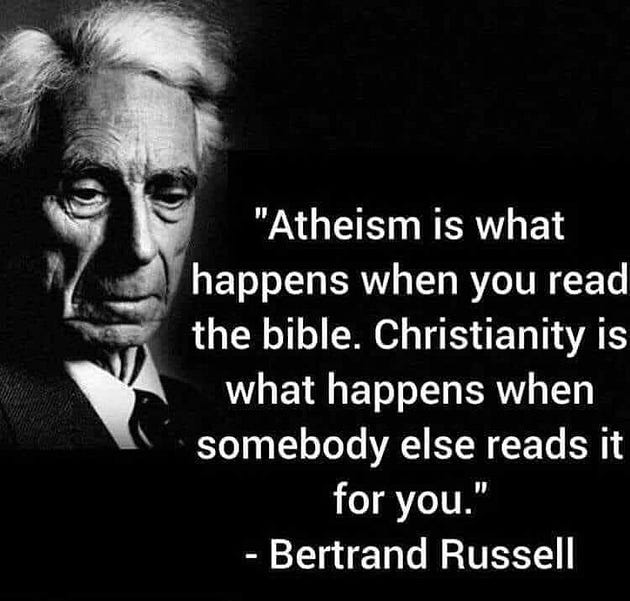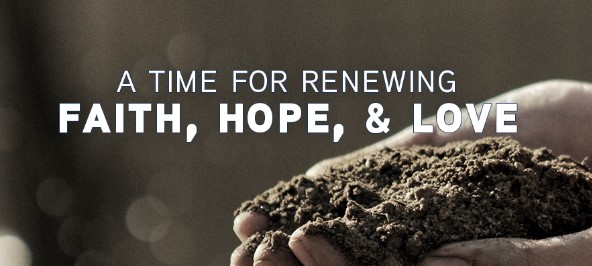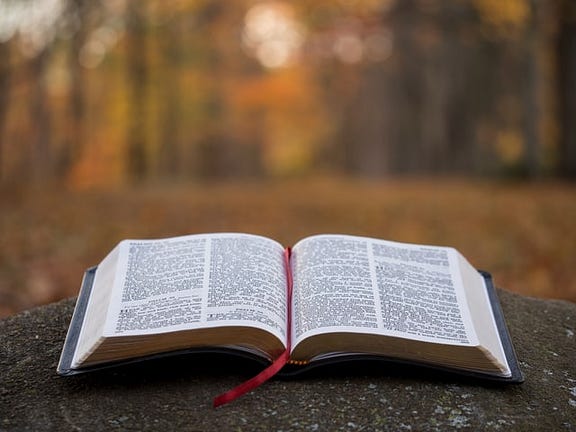 |
| A popular, but incorrect, meme found on Facebook |
WHY I'M NOT AN ATHEIST
June 26, 2022
The Bible is a collection of stories about myths and legends not to report or record history, but to make a theological point.
I suspect this article will irritate two groups of people: atheists, and Fundamentalist Christians. I’m not judging your religious beliefs, or lack thereof, rather I am often asked why I am not an atheist? I am asked this question nearly equally by the two above-named groups. Many of my friends, and family members don’t understand my reasons for abandoning Christianity, my mother’s religion.
On social media, I mentioned that the Bible is not the word of God. It is a collection of myths, stories, and often questionable history. A few fundamentalist folks immediately proclaimed me a heretic and an atheist.
This event followed my visit to an Atheist site that proclaimed the Bible a lie, and that people were worshipping a fantasy. The atheists proclaimed me an ignorant fool who prays to thin air and is anti-science.
Neither case is true, especially the latter.
I was raised in my mother’s Baptist tradition, complete with two Southern Baptist minister uncles. I could memorize phrases from the Bible and use them as “proof” of truth with the best of them.
As a boy, I ran into a buzzsaw at the Wall Street Baptist Church in Kankakee, Illinois, my hometown. My sins must have been memorable because I was sent to the church’s basement with the minister’s wife, so she could engage in some one-on-one brainwashing.
She was not the most intellectual of women.
Here was my deep sin that caused hand-wringing and great concern for my immortal soul. I dared to ask a Sunday School teacher in front of kids why there were two creation stories in the Bible? I wanted to know why Genesis Chapters 1 & 2 are contradictory, with only a shred of similarity?
Rather than answer the question, I was told there weren’t two and I should learn to read. Undaunted, I asked if we all were descendants of Adam and Eve, and she said yes, they were the first created by God, and every human on earth is their descendant.
This was where I ended up in the basement. I asked the teacher, how could that be? Eve had three sons, and who were these people later that Eve’s sons married? Exasperated, the Sunday School teacher told the kids to lay hands on me as she prayed for the demons to be cast out of my soul. She then left, returning with the pastor’s wife.
I won’t regale you with the conversation that led the minister’s wife to hate me until the day she died. Those are stories for another day.
There is a big problem the religious have, and that is a lack of faith, and so they need to hang their faith on a book that is comprised of myths, legends, shakey history, and some outright fiction. It is a trap many thinking people are pushed into, only to fall through the door into believing it is all a lie.
My Mother left our small church primarily because of me. My ability to read, not accept anything at face value and question authority made her scorned by the church management. She had given birth to a heretic and my questions reflected on her as a parent in a negative light.
My mother taught me to question and challenge authority, and she is from where I learned how to state my case the right way. My curiosity reflects on her as a parent in a good way. There is not a religion on earth that doesn’t try to encourage unquestioning, blind obedience, and people like me are a pain for ministers.
Mom stopped taking me to church, and that probably was best for my spiritual life. I was free to read, and question and she didn’t tell me I was Hellbound as I had heard in church. I decided that Christianity was not for me, but I delayed dropping that bomb for a very long time.
I trudged off to college, and in my first semester took a course in religious studies. It was finding an oasis in the desert of religious anti-intellectualism. There is an ocean of differences between biblical scholarship and promoting faith to the masses.
On day one of the class, after a lecture from the professor about statements based on scholarship vs. faith statements, she delivered the news that Moses did not write the first five books of the Bible. I wanted to jump up and scream, “I knew it!” In the Torah, I read laws prohibiting Jews from intermarriage with people from nations that did not exist at the time of the Exodus, and would not come into existence for hundreds of years later.
Many people come to college, take religious studies, and turn to atheism. They feel they are worshiping a big lie. Some adopt atheism as a religion and run around with the zeal of any Christian evangelist spreading their Gospel of Don’t Worship a Lie.
I was lucky. I had a professor who taught more than just scholarship applied to religious writings. She taught me how Bertrand Russell in the meme above got it very wrong.
Her Doctorate is in ancient literature. She taught, and I believe, that the Bible is a collection of stories about myths and legends not to report or record history, but to make a theological point. Approaching it in that light took away the big lie stigma others face when scholarship meets faith. Instead, I was studying literature.
I thought of myths in terms of Greek Mythology. Surely no one believes that man received fire because Prometheus gave it to humans, thereby angering Zeus to the point that Prometheus was chained by Zeus, and his liver eaten by eagles. While it is absurd to believe that myth, there are stories in the Bible no less sensational. In later courses, I learned that the writings of Homer share much in common with The Bible.
The stories that sell myths are literature, and often fiction with tales of magic. They explain the unexplainable and are enlarged by the authors not to be taken literally, but to illustrate a point and teach a theological lesson.
From Dr. Morey-Gaines, I learned about many of the allegories in the Bible. For those who need a refresher on the definition of an allegory, it is a story or poem that is used to illustrate a moral or a political point. Emphasize the word story, because as a story, absolute fact is not required.
The Sodom and Gomorrah story is a prime example. A “righteous man” as the yarn unfolds, does not accurately describe Lot, the protagonist of the tale. There are many messages and sub-messages in the narrative that has nothing to do with sin and debauchery. Two of the central messages of Sodom and Gomorrah are: “get away from evil people,” and “don’t look back.” Whether a city was destroyed, or a woman was killed is not the point.
The dual stories of creation are not the only contradictions in the first five books. I read a source that counts thirteen dualities and contradictions in the Torah.
The Babylonian Creation Myth is the foundation of Genesis 1 and 2, which makes sense, as tradition places Abraham as from Mesopotamia. The myth is present in other religious traditions. Judaism borrows from other traditions, like borrowing the creation story, and puts a local spin on the stories.
In 2022, there are no purely native religions. All have borrowed one another’s material. It grates on the nerves of those who practice religious orthodoxy when I say it’s all good. That is my steadfast belief.
I don’t accept the notion that the Bible is dictated by God. When it is called The Word of God, that is marketing. It is the work of men and many men.
If the religious among us read this far, and I doubt many will, they may ask themselves how can this guy be a theist? Likewise, I am sure some atheists somewhere will think the title of this narrative is clickbait, and deep down I am one of them.
There is another element to my story that I have not brought up. That is the Jewish element, which is central to why I am a thinking person, yet not an atheist.
Whether Jews and Christians want to admit it, the destruction of the Jerusalem Temple was a seismic event for both religions and forced the two branches into a decision. For Jews, it was the birth of Rabbinical Judaism. With no temple, there was no longer a need for Priests, so the Sadducees became people without a job, while the bookish Pharisees emphasized reading Torah and praying, laying the foundation for today’s Judaism.
The loss of the Temple forced Christians to cope by extricating themselves from Judaism and concentrating on the person of Jesus of Nazareth to fill the Temple void. So the destruction of the Temple, rather than the crucifixion in my view was the splitting of Christians and Jews.
In my studies of Judaism, the Torah, Tanakh, and readings in the Talmud, Judaism appeals to me because it concentrates on how we are to relate to one another charitably in this life, rather than emphasizing a life to come. It is about my relationship with a Creator in the here and now and has no hoops to jump through to find God while providing me a guidepost on how to treat others.
Judaism is a three-thousand-year-old tradition, and I am part of it. It horrifies some members of my family who are incredulous at my decision. However, it is my decision, and I am now part of that tradition.
Judaism was good enough for Jesus, and it is good enough for me.
If there is any interest, I will write another text about how I feel about Christianity. It is the religion of my mother and her family. I have no hostility or disrespect for the faith. It is a beautiful religion as they all are when not weaponized for political ambitions.
I have wonderful memories of Christmas with my mom’s family, and with my former wife and children, filled with warmth and love. I can belt out a round of Hark the Herald Angels Sing with the best. Many find comfort, meaning, and God through Christianity. I respect that and my beliefs do not invalidate their religious beliefs.
When I was a young man, often I would try to imagine infinity. I tried to picture the universe expanding with no end and try to comprehend how it all started from nothing.
When I failed in wrapping my brain around that which can’t be enclosed, my only conclusion was the same as the desert dwellers three-thousand years ago, as they sat by their fires telling stories that one day would become scriptures: There must be a God.

















